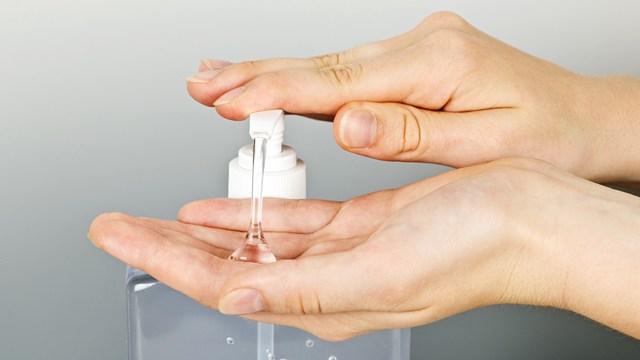 Elena Elisseeva/PhotoSpin
Elena Elisseeva/PhotoSpin
There’s no question that properly washing your hands is one of the most important ways to prevent getting sick and spreading germs to others. This is particularly important during flu and cold season.
However, if you are one of the millions of Americans who lather up with antibacterial soaps and body washes as an extra safeguard against infections, you may not be getting your money’s worth.
In fact, “there currently is no evidence that over-the-counter (OTC) antibacterial (sometimes called antimicrobial or antiseptic) soap products are any more effective at preventing illness than washing with plain soap and water,” said Colleen Rogers, Ph.D., a lead microbiologist at the FDA.
But perhaps more grave, "new data suggest that the risks associated with long-term, daily use of antibacterial soaps may outweigh the benefits," Rogers said. “Antibacterial soap products contain chemical ingredients, which may carry unnecessary risks given that their benefits are unproven.”
Some studies have shown certain ingredients in these soaps, such as triclosan and triclocarban, chemicals found in many antibacterial soaps as well as other beauty products, may contribute to bacterial resistance to antibiotics. And they “may have unanticipated hormonal effects that are of concern to FDA.”
On Dec. 16, 2013, the FDA issued a proposed new rule that would require manufacturers to make more substantial information available to demonstrate the safety and effectiveness of antibacterial soaps.
Under the proposed changes, studies that directly test the ability of antibacterial soap to provide a clinical benefit over washing with plain soap and water will be required, Rogers said in a statement. Currently, soap manufacturers don't have to directly test the effect of a product on reducing infection rates.
The proposed rule covers only those consumer soaps and body washes that are used with water and clearly marked as “antibacterial” or contains a “Drugs Facts” label on its packaging. However it doesn’t apply to hand sanitizers, hand wipes or antibacterial soaps used in health care settings such as hospitals.
Both chemicals are known endocrine disruptors that may impact male and female hormones like testosterone and estrogen, and may also affect thyroid systems which regulate weight and metabolism.
Some lab studies have raised the possibility that triclosan contributes to making bacteria resistant to antibiotics, severely hampering the effectiveness of medical treatments.
More recent data suggest that human exposure to triclosan and triclocarban is higher than previously thought, raising concerns about the potential risks associated with their use regularly and over time, according to the FDA.
“Animal studies have shown that triclosan may alter the way hormones work in the body. While data showing effects in animals don't always predict effects in humans, these studies are of concern to FDA as well, and warrant further investigation to better understand how they might affect humans,” the FDA said in a press statement.
The FDA will entertain comments on the proposed changes for 180 days and invites input from consumers, clinicians, environmental groups, scientists and industry representatives.
Lynette Summerill is an award-winning writer and water sport junkie who lives in San Diego with her husband and two beach loving dogs. In addition to writing about cancer-related issues for EmpowHER, her work has been seen in publications internationally.
Sources:
FDA Taking Closer Look at Antibacterial Soaps. Consumer update. 16 December 2013.
http://www.fda.gov/ForConsumers/ConsumerUpdates/ucm378393.htm
Triclosan and Triclocarban. Breast Cancer Fund. Accessed 16 Dec. 2013.
http://www.breastcancerfund.org/clear-science/radiation-chemicals-and-breast-cancer/triclosan.html
Reviewed December 17, 2013
by Michele Blacksberg RN
Edited by Jody Smith




Add a CommentComments
There are no comments yet. Be the first one and get the conversation started!